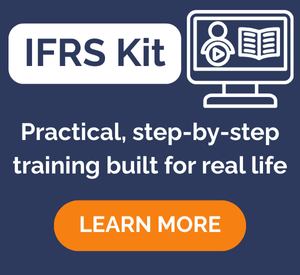IFRS Sustainability Reporting Just Behind Your Door
It is here.
Two newest standards, IFRS S1 and IFRS S2, were published in June 2023.
I think that’s not news for anybody with two eyes and ears, because the information spread everywhere.
Well, my usual approach is rather practical, so I will skip all these talks about WHY we need sustainability and WHY it is good. We all know that already.
So let’s focus on practical questions:
#1 When should we all apply IFRS S1 and IFRS S2?
Both standards are mandatorily applicable for annual reporting periods beginning on or after 1 January 2024.
It practically means that you need to have the appropriate processes in place to monitor and gather all the data you need to provide, so that you can actually start gather the data from 1 January 2024.
Therefore, the first report with incorporating information related to IFRS S1 and IFRS S2 will be published sometime in 2025, related to the year 2024.
#2 What about comparatives?
The good news is that NO, you do not have to present comparative information in the first annual financial statements, that would be related to the period before the date of initial application.
So no worries about monitoring and gathering data in 2023.
Of course, if you do that voluntarily, that’s OK, you can present it.
#3 Can you apply sustainability standards earlier than in 2024?
Yes, of course, provided that you apply both of them at the same time.
#4 Is there any relief in reporting?
Yes, a bit.
You need to provide the disclosures on climate-related risks in the first place, in accordance with IFRS S2.
If you cannot disclose all the related disclosures in accordance with IFRS S1, then you do not need to do so, but only in the first annual reporting period when you apply the standards.
However, in these first annual financial statements with sustainability disclosures, you need to disclose the climate-related disclosures at minimum and then also state that you applied transition relief.
Any questions? Please leave me a comment below, thank you!
Tags In
JOIN OUR FREE NEWSLETTER AND GET
report "Top 7 IFRS Mistakes" + free IFRS mini-course
Please check your inbox to confirm your subscription.
1 Comment
Leave a Reply Cancel reply
Recent Comments
- mahima on IAS 23 Borrowing Costs Explained (2025) + Free Checklist & Video
- Albert on Accounting for gain or loss on sale of shares classified at FVOCI
- Chris Kechagias on IFRS S1: What, How, Where, How much it costs
- atik on How to calculate deferred tax with step-by-step example (IAS 12)
- Stan on IFRS 9 Hedge accounting example: why and how to do it
Categories
- Accounting Policies and Estimates (14)
- Consolidation and Groups (25)
- Current Assets (21)
- Financial Instruments (56)
- Financial Statements (54)
- Foreign Currency (9)
- IFRS Videos (74)
- Insurance (3)
- Most popular (7)
- Non-current Assets (56)
- Other Topics (15)
- Provisions and Other Liabilities (46)
- Revenue Recognition (27)
- Uncategorized (1)





Hi Silvia. Well explained article . But I still have a doubt these two new standards (IFRS S1 and IFRS S2) are they mandatory for all institutions or only listed companies.